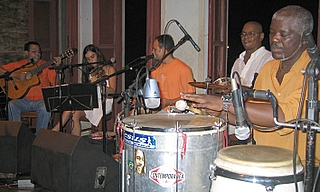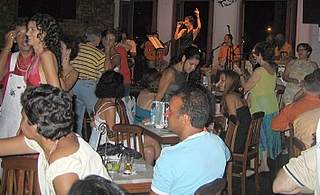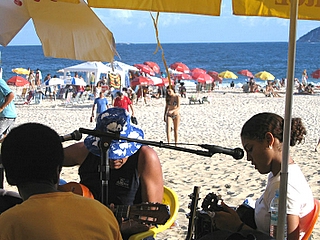I was planning to join my daughter in Nepal at Easter, and go
trekking in the Annapurna region. Diana Penny at Bufo Ventures was going
to book a guide and a porter for us. I booked my own flight to
Kathmandu in mid January, then a couple of days later the King took
over Nepal and cut off all communications. Cancelling my ticket
would have cost a lot, so if Nepal turned out to be a completely
no-go area, the contingency plan was to meet in Delhi instead, and
go to Rajasthan. But I've wanted to go to the Himalayas for
half a century – so we decided to wait and see. The FCO were, and
still are, advising extreme caution and their reports makes quite
alarming reading.
It took some weeks to get first-hand information from Highland
Sherpa, the trekking agency Diana's husband runs. By early
March, Kathmandu was quiet, but strictly under the control of the
King and the military police. In the west of the country the
Maoists were causing some problems and there was some localised
fighting in the Pokhara region. For tourists, the only
inconvenience was some random roadblocks and demands for money.
We were advised to switch our plans from Annapurna to Everest, and
that's what we did. Luckily we were able to book flights to
Lukla – everyone else had the same idea, so flights were scarce.
There are no Maoists in that area and the Nepalese are very anxious
to keep their trekking and tourism expanding as everybody relies on
it for an income.
So for eight glorious days we trekked up towards Everest, getting
as high as Dingboche before descending by a different route. The
local people were charming and hospitable and most of the time you
are never far from food, drink and shelter. We met people who had
been to Annapurna and had been accosted by Maoists and parted with
their 1000 rupees on demand – and even had their photos taken with
them! You get a receipt for your 'payment', so if you are
held up by another gang, you can show your receipt and will usually
be let off. It amounts to less than £10, but you wouldn't want
to do it every day or you would have to double your budget! (On our
first night, our bill for a double room, plus lunch, evening meal
and breakfast for two came to 1300 rupees – a little over £10). One
solo trekker we met said she had spent £57 on her nine-day trek,
but she admitted she didn't have many showers, as they cost
over £1!
The only other restriction in places where there is a military
presence is a curfew at sundown. Above Lukla, we only saw a few
soldiers – near the ticket office for the Sagarmatha National Park
on the outskirts of Namche Bazaar. Their camp is just above the
village and it has a very interesting visitor centre you can go
into – that's in addition to Sherpa Museum and the History
Museum of the Himalayas, under reconstruction in Namche, both close
by the camp. In Lukla itself I was challenged politely by a soldier
as I returned to my lodge near the airport after watching the
sunset at a neighbouring Lodge. In Kathmandu there are still shops
and restaurants open in the tourist Thamel district long after
dark, so your walk back to outlying hotels may be in darkened
streets, but represents no problem.
There are also well-advertised strikes throughout the country from
time to time, so if you are relying on public transport these might
delay you. Trekkers were flying back to Kathmandu from Lukla,
rather than risk the 5-day walk to Jiri only to find the bus back
to town (an 11-hour) journey, wasn't running!
So if you have the time to walk the extra miles, or can afford the
air fare to Lukla, don't miss out on seeing Everest. The main
trails are easy to follow, though not often signposted. There are
plenty of lodges and teashops to stop at. On the longer ascents you
are usually warned that you are passing 'the last stopping
place'. Stopping is essential, as gaining height slowly is the
best way to ward off altitude sickness. So you stop to admire the
magnificent views, rather than keep looking around and stumbling.
You stop to let yaks pass you, standing safely against the
mountain, not the outer edge of the path! You stop to let porters
carrying enormous loads overtake you. You stop to chat to fellow
trekkers – its amazing how often you meet up with the same people.
It's a fantastic trip, so DON'T LET THE PRESS PUT YOU OFF.
The monsoon season starts at the end of May – so hurry!

 The gentle
sound of Guitars drifting across the tropical air whether it be in
the market square in the borough of Laranjeiras or by the beach in
Ipanema, introduced me to the sound called “Chorinho” –
The crying or weeping of guitars. The music started about the turn of the 20th century and like jazz is free flowing and improvised. The lead instrument is called a
“Cavaquinho”, a small guitar and the music is always
instrumental in form, but many times has a flute or Sax amongst the
various guitars. The undulating but easy listening rhythm is
controlled by the guitars and usually one tambourine.
“Chorinho” fell out of fashion for a time but seems to be
making a come back, especially on Saturday mornings around the
town, where the musicians gather quite a crowd.
The gentle
sound of Guitars drifting across the tropical air whether it be in
the market square in the borough of Laranjeiras or by the beach in
Ipanema, introduced me to the sound called “Chorinho” –
The crying or weeping of guitars. The music started about the turn of the 20th century and like jazz is free flowing and improvised. The lead instrument is called a
“Cavaquinho”, a small guitar and the music is always
instrumental in form, but many times has a flute or Sax amongst the
various guitars. The undulating but easy listening rhythm is
controlled by the guitars and usually one tambourine.
“Chorinho” fell out of fashion for a time but seems to be
making a come back, especially on Saturday mornings around the
town, where the musicians gather quite a crowd.
 A place not to be missed if you are in Rio is,
“Centro de Cultura do Carioca”. A club or bar in the City
of Rio, near the club land of the district of Lapa, that appeals to
people of all types and ages and has very good Samba, Choarinho,
Popular Brazilian Music and always has a first class group and
singers. 15 R$ (four pounds Sterling) entrance fee and tins of beer
for about 60p each. Caipirinha, a large one costs one pound
fifty.
A place not to be missed if you are in Rio is,
“Centro de Cultura do Carioca”. A club or bar in the City
of Rio, near the club land of the district of Lapa, that appeals to
people of all types and ages and has very good Samba, Choarinho,
Popular Brazilian Music and always has a first class group and
singers. 15 R$ (four pounds Sterling) entrance fee and tins of beer
for about 60p each. Caipirinha, a large one costs one pound
fifty.
 The only tourists, if you could call them that, were
an American Surfing Photographer, who had lived here for four
years, an Argentinean, who had fallen in love, both with Rio and a
girl during Canaval. As the club empted about 3.30 am my friends
and I went to sit by the sea in a district called Leme. A bar
called “Sindicato do Chopp” (Union of the Draft Beers) I
knew it well from a past magazine shoot and there we relaxed and
downed a last drink before that magic hour when the sun rose and my
lovely cool Princess, turned into Sleeping Beauty and I turned back
into a frog.
The only tourists, if you could call them that, were
an American Surfing Photographer, who had lived here for four
years, an Argentinean, who had fallen in love, both with Rio and a
girl during Canaval. As the club empted about 3.30 am my friends
and I went to sit by the sea in a district called Leme. A bar
called “Sindicato do Chopp” (Union of the Draft Beers) I
knew it well from a past magazine shoot and there we relaxed and
downed a last drink before that magic hour when the sun rose and my
lovely cool Princess, turned into Sleeping Beauty and I turned back
into a frog.